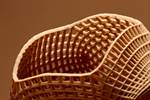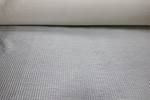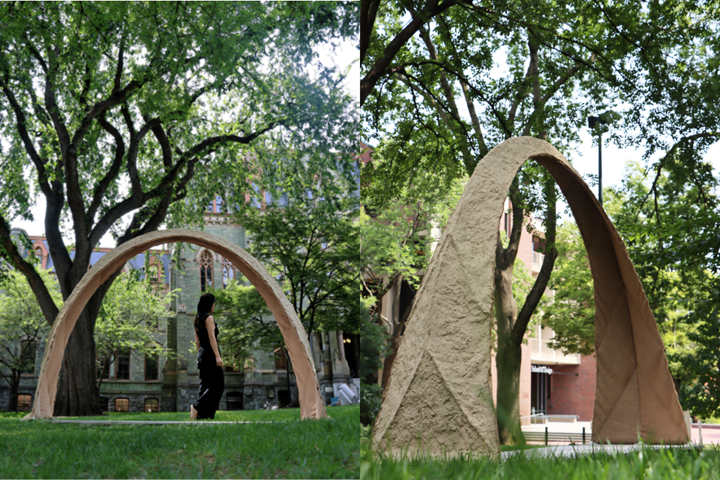DumoLab's biodegradable arch enables biocomposite concrete alternatives
Terrene 3.0 is a compression-dominant arch developed as a multidisciplinary research project composed of natural fiber-reinforced sand and other biomaterials that delivers eco-friendly, less energy-intensive building methods.
Terrene 3.0 Biodegradable Earthen Composite Arch by DumoLab Research.Terrene 3.0 Biodegradable Earthen Composite Arch by DumoLab Research.
In order to mitigate the greenhouse gas (GHG) emissions contributed by modern building practices — the use of glass, steel and cement, for example, are the cause of 11% of global emissions — a team of researchers from DumoLab Research at the University of Pennsylvania’s (Philadelphia) Stuart Weitzman School of Design, with collaborators from the Polyhedral Structures Lab and Complex Fluids Lab, developed the Terrene 3.0 Biodegradable Earthen Composite Arch, a biocomposite concrete alternative for architectural applications.
Taking from more natural, less energy-intensive resources, Terrene 3.0 explores the enhancement of lightweight, bio-based earthen construction in a wide leg arch by combining structural and material optimization methods. It is composed of ChitoSand — a thin bilayer of sand augmented with chopped flax fiber, citric acid as a plasticizer and bound by chitosan biopolymer — and underlaid by a sewn burlap fabric base layer. The fiber reinforcement provides the arch with increased tensile strength, the citric acid stability, and the burlap confers additional bending stability. Together, according to an article submitted on the project, the structure “offers concrete-like strength when employed in a structure and nutrients back to the soil when degraded,” achieving minimal waste during fabrication.
Future work is underway to enhance water resistance, increase scale and explore other material options to enable a more permanent earthen tension-compression pavilion.
“At DumoLab, we use simple materials and ambient conditions manufacturing to assemble structures closer to nature’s way and with properties competitive with other unsustainable practices,” says Dr. Laia Mogas-Soldevila, director of DumoLab Research and assistant professor of architecture at the University of Pennsylvania.
Mogas-Soldevila has also been a part of the Water-Based Digital Fabrication project that CW reported on in 2021. The MIT project developed and patented a novel robotic deposition system using water-based solutions of bio-polymers like chitin and cellulose to create tailored biocomposite structures.
For more information about DumoLab, click here.
Related Content
-
Super Resin Inc. highlights plant-based epoxy resin, foam core
Eco-friendly resin system using glycol lignin offers an eco-friendly option for CFRP structures and components, and core materials.
-
Okom wrks labs works with Autodesk for mycelium-based composite commercialization
Research Residency program will further refine material properties and manufacturing processes to support the startup’s efforts of providing high-performance, regenerative biocomposite solutions.
-
Bioabsorbable and degradable glass fibers, compostable composite parts
ABM Composite offers sustainable options and up to a 60% reduction in carbon footprint for glass fiber-reinforced composites.













